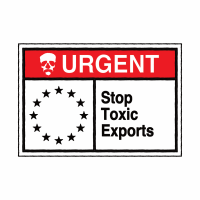Ahead of 3 December Global No Pesticides Day, More than 326 civil society organisations from across the globe, institutions and trade unions have published a Joint Statement demanding a ban on the export of hazardous chemicals that are forbidden in the EU. They urge the European Commission not to postpone the promised legislative proposal to achieve this.
In 2018 alone, more than 81,000 tonnes of pesticides containing 41 different hazardous chemicals banned for agricultural use in the EU, were exported by European corporations.
A Joint statement signed by 326 NGOs and trade unions demands a ban on the export of pesticides and other hazardous chemicals that are forbidden in Europe is published today.
Today a export ban petition delivered to Environment Commissioner Sinkevičius signed by more than 200,000 people citizens from across the world.
Today a conference in Brussels to include speakers from NGOs and the trade union movement, the European Commission, European Parliament, and EU governments, covering topics including the impact of pesticides on farmworkers and communities in the Global South, findings of a new study on exports of banned pesticides, Member States and export bans on pesticides and hazardous chemicals, and the state of play for an EU-wide ban.
The European Commission committed in the EU Green Deal’s Chemicals Strategy for Sustainability Towards a Toxic-Free Environment in 2020 to “lead by example, and, in line with international commitments, ensure that hazardous chemicals banned in the European Union are not produced for export, including by amending relevant legislation if and as needed.” However, the European Commission’s 2023 work programme does not include a much needed legal action to stop this practice.
A spokesperson for the civil society coalition said:
“This should be a non-brainer for the EU to act fast. Low- and middle-income countries like Morocco, South Africa, India, Mexico, Malaysia or Brazil are flooded with dangerous pesticides banned in the EU, which cannot be safely used and which have devastating impacts on both human health and the environment, resulting in widespread infringement of human rights. Moreover, these countries are among the biggest exporters of agri-food products to the EU and so banned pesticides might be ending up on the dinner plates of EU citizens.”
For more information or interviews:
- Martin Dermine, Pesticide Action Network (PAN) Europe: martin [at] pan-europe.info; +32 486 32 99 92
- Angeliki Lyssimachou, Health and Environment Alliance (HEAL): angeliki [at] env-health.org; +32 496 392930
- Laurent Gaberell, Public Eye: laurent.gaberell [at] publiceye.ch; +41 78 204 50 60
- Eva Corral, European Environmental Bureau (EEB): eva.corral [at] eeb.org;
- Nina Holland, Corporate Europe Observatory (CEO): Nina [at] corporateeurope.org; +32.466.294420
- Eoin Dubsky, SumOfUs: eoin [at] sumofus.org; +31641636410
Notes to the editor:
- You can find the Joint Statement HERE.
- You can find the joint petition HERE.
- December 3 is the anniversary of the worst peacetime chemical disaster in history. Twenty-seven tons of lethal gases leaked from Union Carbide’s pesticide factory in Bhopal, India on this date in 1984, immediately killing thousands of people and poisoning half a million others. Pesticide Action Network (PAN) International honors the memory of these Bhopal victims every year with an international “Day of No Pesticide Use” an annual reminder that agricultural chemicals are harming communities around the world every day. More information of the International Day of No Pesticide Use, PAN International Urges Move Towards Agroecology.
